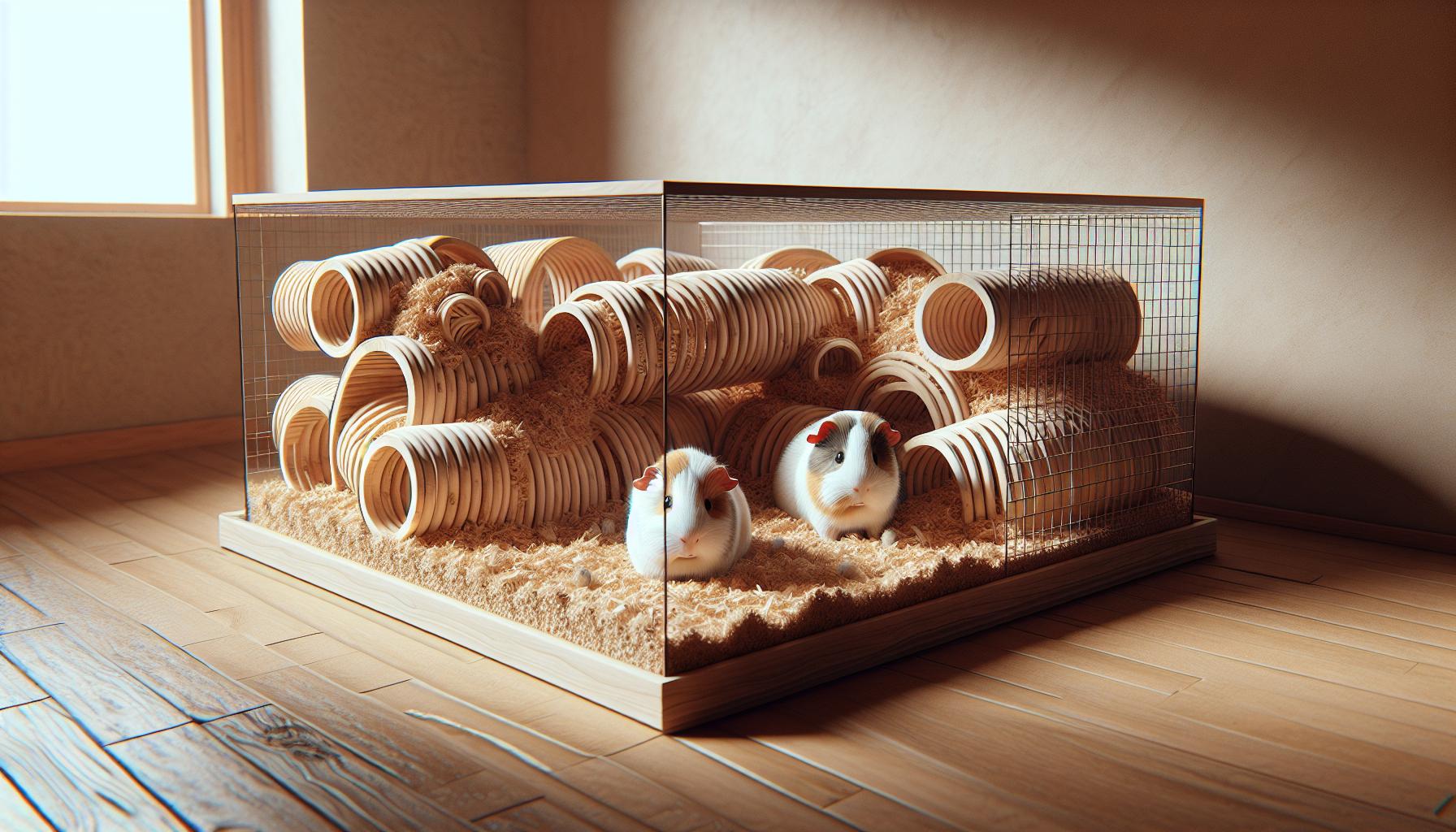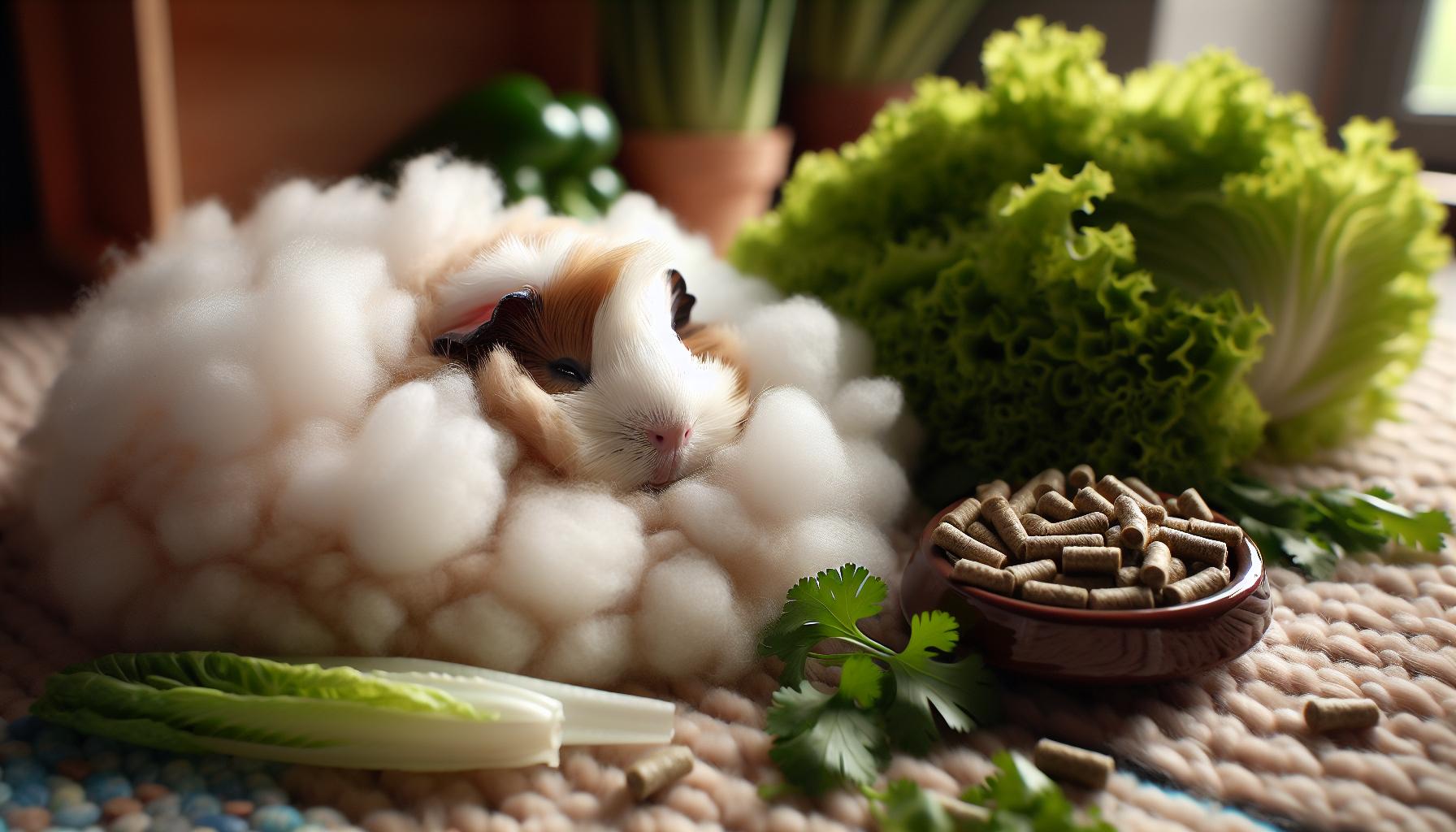How to take care of newborn guinea pigs: Welcoming newborn guinea pigs into your home is an exciting experience. These tiny furballs are not only adorable but also require special care to thrive. As a new guinea pig owner, it’s essential to understand their unique needs right from the start.
In this guide, I’ll share practical tips and insights on how to ensure your little ones grow up healthy and happy. From their diet to their living environment, every detail matters. Let’s dive into the essentials of how to take care of newborn guinea pigs.
Key Takeaways
- Special Care Requirements: Newborn guinea pigs have unique needs, relying on their mother for milk and warmth initially, then needing a specific diet of high-quality hay and specially formulated pellets post-weaning.
- Ideal Living Environment: Create a spacious cage with solid flooring, proper bedding, and hiding spots to promote security and comfort for your guinea pigs.
- Balanced Nutrition: Ensure their diet includes fresh vegetables and hay, while introducing pellets at around three weeks of age to support healthy growth and digestion.
- Health Monitoring: Regularly observe for common health issues such as respiratory infections and maintain routine veterinary checkups for ongoing wellness and guidance.
- Socialization and Handling: Building trust through gentle handling and interactions is essential for their emotional well-being; aim for short sessions that gradually increase as they become more comfortable.
How to Take Care of Newborn Guinea Pigs
How to take care of newborn guinea pigs; Newborn guinea pigs require special attention to thrive in their new environment. Understanding their needs helps ensure their health and happiness.
Importance of Proper Care
Proper care influences a newborn guinea pig’s growth and overall well-being. Providing a clean and safe living space, appropriate nutrition, and regular health checks promotes strong development. Establishing a routine also reduces stress, making it easier for them to adapt to their new home.
Unique Needs of Newborns
Newborn guinea pigs come with unique needs that differ from adults. They depend on their mother for the first few weeks for milk and warmth. Post-weaning, they require high-quality hay, specially formulated pellets, and fresh vegetables to support their rapid growth. Additionally, they need a quiet, low-stress environment with plenty of hiding spots to feel secure. Providing companionship from other guinea pigs helps meet their social needs, promoting healthier emotional development.
Setting Up An Ideal Environment

Creating an ideal environment for newborn guinea pigs ensures their health and happiness. Properly setting up their living space addresses their specific needs and enhances their overall well-being.
Cage Setup Requirements
- Cage Size: Use a spacious cage measuring at least 7.5 square feet for a pair of guinea pigs. Larger cages offer more room for exercise and exploration.
- Cage Type: Select a cage with a solid bottom rather than wire flooring. Solid surfaces prevent injuries and provide better footing for newborns.
- Cage Location: Position the cage in a quiet area away from direct sunlight and drafty locations. Consistent temperature and minimal stress help keep them comfortable.
- Access Points: Ensure the cage has wide openings for easy access. This feature simplifies feeding, cleaning, and handling of the guinea pigs.
- Play Area: Set up a designated play area outside the cage. Supervise playtime on a soft surface to prevent injuries and encourage movement.
- Bedding Type: Use soft, absorbent bedding such as aspen shavings or paper-based products. Avoid cedar or pine shavings, as these can be harmful to their respiratory health.
- Bedding Depth: Maintain a bedding layer of 1-2 inches. This depth absorbs moisture and provides cushioning for the newborns.
- Hiding Spots: Include hideouts and tunnels in the cage. These structures create a sense of security and provide newborns with places to retreat when feeling scared.
- Temperature Control: Keep the cage temperature between 65°F to 75°F. Monitor the environment regularly to avoid extreme fluctuations that may stress the guinea pigs.
- Cleaning Routine: Conduct regular cleanings, removing soiled bedding and waste daily. This practice helps maintain a hygienic environment and prevents health issues.
Nutrition for Newborn Guinea Pigs

Newborn guinea pigs require specific nutrition to thrive. It’s crucial to provide a balanced diet that supports their rapid growth and development.
Feeding Guidelines
I focus on offering a diet rich in essential nutrients. During the first few weeks, newborns rely on their mother’s milk. Once they reach approximately three weeks of age, I introduce a high-quality, specially formulated pellet designed for young guinea pigs, ensuring that pellets contain vitamin C. I also provide unlimited access to fresh hay, like Timothy hay, which supports digestive health. I monitor portion sizes to avoid overfeeding while ensuring they consume enough food for their growth needs.
Importance of Fresh Food
Fresh food plays a vital role in a newborn guinea pig’s diet. I always add a variety of fresh vegetables daily, such as leafy greens like romaine lettuce and cilantro, to provide added vitamins and minerals. I avoid feeding starchy or sugary vegetables. Fresh food not only supplies necessary nutrients but also encourages natural foraging behavior, stimulating mental activity. Regularly rotating food items prevents dietary boredom and keeps them engaged.
Health Care and Monitoring

Monitoring the health of newborn guinea pigs is crucial for their well-being. Regular observation and timely intervention can prevent serious health concerns.
Common Health Issues
Newborn guinea pigs may experience several common health issues that require attention:
- Respiratory Infections: Look for signs like sneezing, coughing, or labored breathing, which could indicate respiratory problems.
- Diarrhea: Watery stools can lead to dehydration, signaling a need for dietary adjustments or veterinary consultation.
- Dental Issues: Misalignment or overgrowth of teeth can affect eating, so observe their chewing habits for irregularities.
- Skin Problems: Unusual balding or lesions may suggest mites or fungus, requiring immediate treatment.
- Bloat: A distended abdomen can signal digestive distress; monitor for lethargy or avoidance of food.
Regular Checkups
Regular vet checkups ensure ongoing health monitoring for newborn guinea pigs. Schedule visits every 6 months or sooner if issues arise. Utilize these appointments to:
- Assess Growth: Weigh guinea pigs to confirm healthy weight gain and development.
- Evaluate Diet: Discuss dietary needs with your veterinarian to make necessary adjustments.
- Vaccinations: Ensure your guinea pigs are up-to-date on any required vaccinations to prevent disease.
- Parasite Prevention: Discuss treatments for internal and external parasites to keep them healthy.
- Health Screenings: Request wellness screenings to check for underlying health issues.
Taking proactive health measures contributes to the long-term happiness and vitality of newborn guinea pigs. Keep a close eye on their behavior and seek veterinary advice when needed.
Socialization and Handling
Socialization and handling newborn guinea pigs play a crucial role in their development. Establishing a bond early fosters trust, reducing stress as they grow.
Importance of Bonding
Bonding with newborn guinea pigs encourages their social skills and emotional well-being. Regular interaction helps them become comfortable with humans and other guinea pigs. By holding them gently and talking softly, I can create positive experiences that lead to a more affectionate pet. Research shows that well-socialized guinea pigs are generally healthier and exhibit less anxiety. Fostering companionship among siblings or introducing a compatible friend promotes social interactions, as guinea pigs thrive on companionship.
Safe Handling Techniques
Utilizing safe handling techniques protects both the guinea pig and me during interactions. Always wash my hands before handling to prevent the transmission of bacteria. I should support their body with both hands, cradling their backside while letting their front feet rest against my forearm. This method ensures they feel secure and minimizes the risk of dropping them.
Keeping handling sessions short initially, around 3-5 minutes, allows newborns to acclimate without becoming overwhelmed. Gradually increasing the time fosters a positive association with being held. Additionally, avoiding sudden movements and loud noises creates a calm environment that helps them feel safe. Using soft bedding during transport or playtime reduces stress, encouraging playful behaviors and exploration.
Creating a Loving Space Allows them to Thrive Emotionally and Socially.
Caring for newborn guinea pigs is a rewarding journey that requires attention and commitment. By providing a safe environment proper nutrition and regular health checks I can ensure they grow into healthy happy adults.
Establishing trust through gentle handling and socialization is equally important. Creating a loving space allows them to thrive emotionally and socially.
With the right care I’m confident that my newborn guinea pigs will flourish and bring joy to my home. Every effort I make contributes to their well-being and strengthens our bond. Embracing this responsibility is truly fulfilling.
